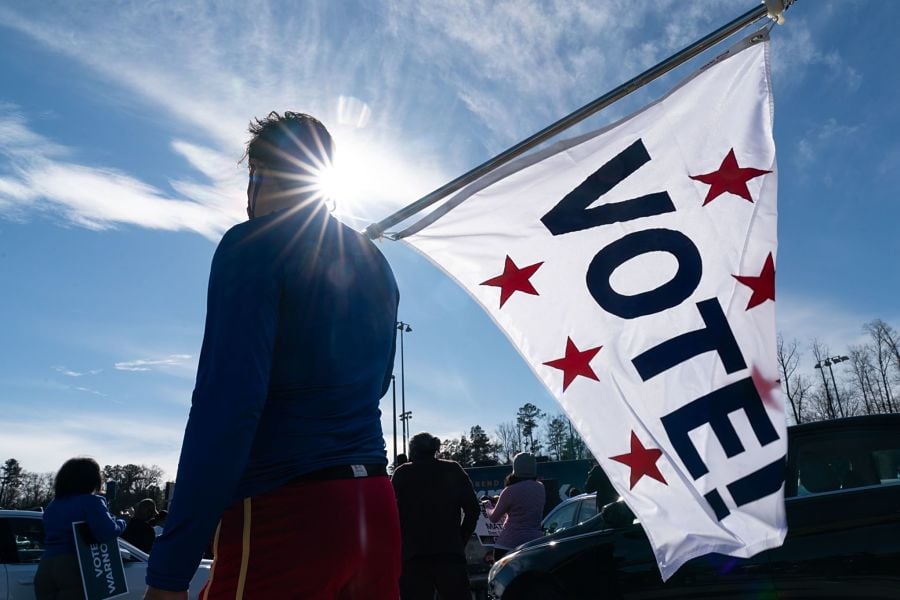

One of the biggest challenges facing U.S. corporations is determining where they stand -- or if they should comment -- on election reform laws that are proliferating across the country.
A recent Georgia measure puts restrictions and identification requirements on mail-in balloting and limits ballot drop boxes but also expands early voting. The Coca-Cola Co. and Delta Air Lines Inc., both headquartered in Atlanta, and other companies oppose the law.
The companies have received strong blowback from Republicans, including U.S. Senate Minority Leader Mitch McConnell, R-Ky., who has essentially told corporations wading into the politics of ballot access to mind their own business.
But following the Jan. 6 riot at the U.S. Capitol, perpetrated by supporters of former President Donald Trump who were stoked up by his false claims of a stolen election, the debate over reforming voting procedures has blown up.
“Corporate America can’t hide,” said Howard Schweitzer, chief executive of Cozen O’Connor Public Strategies, a government affairs affiliate of the law firm. “They’re kind of caught in the middle.”
In a recent analysis, Schweitzer argues that the pressure is increasing on companies to make their voices heard on public policy.
“Stakeholders expect corporations to look out for the greater good, and if they don’t, they pay a literal and figurative price,” Schweitzer wrote.
JPMorgan Chase & Co. CEO Jamie Dimon asserted in his annual shareholder letter that firms must take stand on political issues.
It would seem that the struggle over ballot access would fit neatly as a factor in environmental, social and governance investing. What could be more “G” in an ESG evaluation of a company than parsing whether it weighs in on how the world’s most prominent democracy runs its elections.
But democracy writ large is systemic issue, making it difficult to drill down to the influence at the corporate level, said Paul Washington, executive director of The Conference Board’s ESG Center.
“There is less of a direct connection between a particular company and these voting laws, unless a company takes a stand and it backfires on them,” Washington said.
There’s plenty of crossfire to step into on the voting rights debate. On Wednesday, the conservative Heritage Foundation launched a $1 million advertising campaign in support of the Georgia law.
Jessica Anderson, executive director of the Heritage Action Fund, said in a statement that the Georgia law “makes it easier to vote and harder to cheat.”
The challenge for a company in opposing the Georgia law is that it’s full of policies that proponents argue expand voting opportunities and that opponents assert deny the franchise, especially to voters of color.
“Companies may want to take a more principles-based approached rather than engage in a detailed debate about the specific provisions of these laws that are unfolding in a hyper-partisan environment,” Washington said.
That’s the approach many Wall Street firms seem to have adopted. When I recently surveyed 14 brokerages and the Washington trade associations that represent them, none took a stance on the Georgia law or legislation the U.S. House recently approved to expand ballot access.
Instead, I received a couple of general statements -- from Morningstar Inc. and Merrill Lynch, for instance -- that called on lawmakers to protect the right to vote.
Hundreds of companies and business leaders signed a statement this week that said in part "we all should feel a responsibility to defend the right to vote and to oppose any discriminatory legislation or measures." It ran as an ad in the New York Times and other publications on April 14.
The effort was led by the Black Economic Alliance, and financial industry signatories included Bank of America, Berkshire Partners, BlackRock, Broadridge Financial Solutions, Inc., Cambridge Associates, Goldman Sachs, T. Rowe Price, Vanguard and Wells Fargo.
Staying at the 35,000-foot level allows a company to make its presence felt by flying over the voting-access debate without getting close enough to the legislative ground to get hit with shrapnel from the legislative firefight.
A big financial firm like JPMorgan has the heft to take care of itself in the rough-and-tumble political world. It also has a CEO in Dimon who is plugged into Washington. He can pretty much stand up to McConnell and other Republicans who take umbrage at the firm’s political activity.
But a small advisory firm in Georgia has a tougher decision to make if it wants to oppose the state’s voting law or just generally support expanding voting rights.
It doesn’t have JPMorgan’s political wherewithal. Instead, it may want to join a coalition of like-minded firms or work through a trade association that represents advisers.
“It might make sense for firms to consider what kind of collective impact they can have,” Washington said.
The debate over how the U.S. conducts its elections is sure to continue for a long time because it is fundamental to this country’s democratic foundation. Firms will have to weigh in, whether it’s to support the principle of wide voting access, to criticize bills that curtail it, or to do a little of both.
Editor's Note: This story was updated to reflect the statement in support of voting rights signed by hundreds of companies and executives.

Relationships are key to our business but advisors are often slow to engage in specific activities designed to foster them.

Whichever path you go down, act now while you're still in control.

Pro-bitcoin professionals, however, say the cryptocurrency has ushered in change.

“LPL has evolved significantly over the last decade and still wants to scale up,” says one industry executive.

Survey findings from the Nationwide Retirement Institute offers pearls of planning wisdom from 60- to 65-year-olds, as well as insights into concerns.
Streamline your outreach with Aidentified's AI-driven solutions
This season’s market volatility: Positioning for rate relief, income growth and the AI rebound
